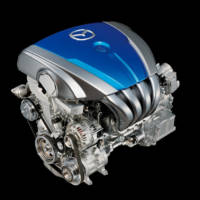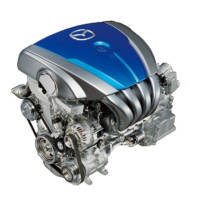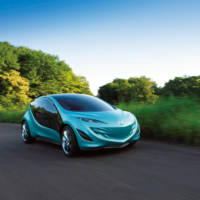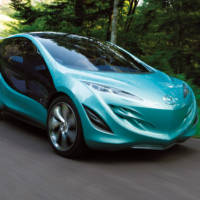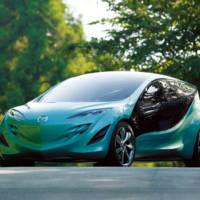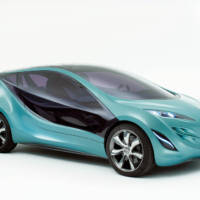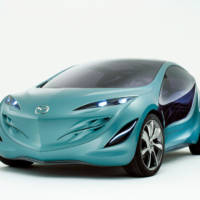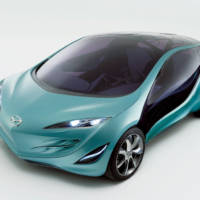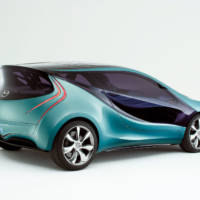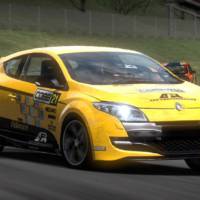This year at the 41st Tokyo Motor Show, Mazda will introduce their new direct injection gasoline and clean diesel engine lineup as well as the next generation automatic transmission.
The new Mazda SKY-G direct injection gasoline powering unit features a newly developed engine block that helps reduce friction and improves the air-fuel mix plus a new set of injectors and a better variable valve timing mechanism. These changes enable the Mazda SKY-G gasoline engines to offer not only an increased level of power but also reduced fuel consumption.
The Mazda SKY-D clean diesel units also received a redesigned engine block that helps in optimizing pressure and temperature in the cylinders. A set of piezo injectors and a 2-stage turbocharger have been fitted and compared to the current 2.2-litre diesel engines, the new SKY-D is close to 20 percent more fuel efficient.
As far as the new automatic transmission Mazda developed a revised torque convertor and clutch and an optimized lock-up mechanism that enable a 5 percent fuel economy, while mechanical friction was reduced thanks to a complete redesign.
The Japanese automaker also announced that it will debut the Mazda Kiyora concept car that returns 32 Km/l in Tokyo in October.
Mazda press release :
Mazda Motor Corporation will showcase the world premiere of its next-generation engine lineup and automatic transmissions at the 41st Tokyo Motor Show, to be held from Saturday, October 24 through Wednesday, November 4, 2009. Mazda will exhibit the ‘Mazda SKY-G’ direct injection gasoline engine, the ‘Mazda SKY-D’ clean diesel engine and the ‘Mazda SKY Drive’ high-efficiency automatic transmission. The Tokyo Motor Show, to be held at Makuhari Messe in Chiba Prefecture, will also mark the Japan debut of the Kiyora concept car as an exhibit of Mazda’s next-generation environmental and safety technologies.
Mazda’s theme for the 2009 Tokyo Motor Show is “The Mazda SKY concept—Providing driving pleasure and environmental and safety features for all customers!” Under the headings of “Today,” “Tomorrow” and “The Future,” Mazda will display advanced technologies designed to improve the average fuel economy of Mazda vehicles sold globally 30 percent by 2015 compared to 2008 levels. This is one of the goals of Mazda’s long-term vision for technology development, Sustainable Zoom-Zoom.
Mazda is committed to significantly improving the core aspects of its vehicles that affect performance – engines, transmissions, and lighter vehicle weight – in order to achieve elevated driving pleasure together with outstanding environmental and safety features. The Mazda SKY concept defines Mazda’s approach to developing next-generation powertrains that will significantly improve the eco-friendliness and dynamic performance of all Mazda vehicles. The SKY concept embodies Mazda’s desire to ensure an “everlasting blue sky” under which drivers will always be able to enjoy the fun-to-drive pleasure afforded by owning a Mazda. The concept also reflects the “sky’s the limit” aspirations of Mazda’s engineers as they employ unconventional thinking to achieve optimal performance in every vehicle that bears the Mazda nameplate.
Based on the SKY concept, Mazda’s “Technologies for Tomorrow” display at this year’s Tokyo Motor Show will include the next-generation direct injection gasoline Mazda SKY-G engine and the Mazda SKY-D clean diesel engine. Both offer improved eco-friendliness and torque thanks to optimized combustion efficiency. Mazda will also reveal the first next-generation automatic transmission, the Mazda SKY-Drive, which offers first-rate fuel economy and a direct driving performance feel.
The Mazda Kiyora, a next-generation compact concept car imbued with Mazda’s fun-to-drive character, will make its Japanese debut at the Tokyo show. Featuring the next-generation Mazda SKY concept powertrain technologies and comprehensive advancements in weight reduction, the Kiyora achieves outstanding fuel economy of 32 kilometers per liter (under Japan’s 10-15 mode test cycle).
Alongside the SKY concept exhibits, Mazda will also feature a “Today’s Technologies” exhibit that includes i-stop, a unique idling stop system that was introduced with the all-new Mazda Axela (known as the Mazda3 overseas). “Future Technologies” will showcase the advanced Mazda Premacy Hydrogen RE Hybrid, with its hydrogen-powered rotary engine, and various vehicle technologies under development as part of Mazda’s drive to realize an accident-free and safe motorized society.
The 41st Tokyo Motor Show press days will be October 21-22, with a special invitation day on October 23. The show will be open to the public from Saturday, October 24 through Wednesday, November 4. Mazda will hold its press conference at 12:30 p.m. (JST) on Wednesday, October 21, 2009.
Summary of major exhibits
Mazda Kiyora
The Mazda Kiyora is a compact concept car that is both extremely eco-friendly and fun-to-drive due to the combination of Mazda’s next-generation direct injection Mazda SKY-G 1.3 engine and new compact and lightweight six-speed Mazda SKY-Drive automatic transmission. The Kiyora achieves excellent fuel economy figures of 32 kilometers per liter (under Japan’s 10-15 mode test cycle) aided by Mazda’s unique i-stop idling stop system, regenerative braking, and advanced aerodynamics around a compact body that is 100 kilograms lighter than Mazda’s current mass production model in the same segment.
Mazda Premacy Hydrogen RE Hybrid
In March 2009, Mazda began leasing the Mazda Premacy Hydrogen RE Hybrid to Japanese government authorities and energy-related organizations. It features a unique series hybrid system, consisting of a hydrogen rotary engine connected to a generator that powers an electric motor. This advanced powertrain enables the Premacy Hydrogen RE Hybrid to achieve a hydrogen-fueled driving range of 200 kilometers. The vehicle also employs Mazda’s plant-derived Biotechmaterials*, reflecting initiatives to realize use of non-petroleum-based resources and reduce CO2 emissions.
* Biotechmaterials is the collective name for plant-based materials that Mazda is developing, including bioplastic and biofabric.
Next-generation direct injection Mazda SKY-G gasoline engine
Mazda SKY-G is a next-generation direct injection gasoline engine with significantly improved fuel economy and output performance due to enhanced thermal efficiency. The engine block is newly designed to reduce mechanical friction and achieve an optimal air-fuel mix, and a direct fuel injection system is employed due to the wide variety of spray profiles that are possible, enabling the maximum expansion ratio to be achieved. Specifically, fuel economy and torque are improved by approximately 15 percent compared to Mazda’s current 2.0-liter engine. This was achieved by adopting next-generation fuel injectors and a highly functional variable valve timing mechanism. The engine enables fuel economy equivalent to the current Mazda Demio (known as the Mazda2 overseas) to be achieved in a vehicle the size of a Mazda Axela (Mazda3).
Next-generation clean diesel Mazda SKY-D engine
Mazda’s new SKY-D clean diesel engine boasts high fuel economy and output performance as well as low exhaust emissions. The newly designed engine block reduces mechanical friction to the level of a gasoline engine. By optimizing the pressure and temperature in the cylinders, the shape of combustion chambers, and the fuel injection rate, combustion begins at the best timing in terms of thermal efficiency. Specifically, by employing piezo injectors, a two-stage turbocharger and other technologies, fuel economy becomes approximately 20 percent better than the current 2.2-liter diesel engine. Mazda has achieved fuel economy equivalent to the current Mazda Demio (known overseas as the Mazda2) in a vehicle the size of a Mazda Atenza (Mazda6).
Next-generation Mazda SKY-Drive automatic transmission
Mazda’s next-generation SKY-Drive automatic transmission is highly efficient, contributing to substantially improved fuel economy and a more direct feel compared with the current unit. It improves fuel economy by approximately five percent, due to a complete redesign that significantly reduces mechanical friction, a revised torque converter and clutch with minimized slip, and an optimized lock-up mechanism. A rapid clutch action was achieved by identifying the minimum amount of fluid necessary. This also helped to realize a direct feel similar to a dual clutch transmission.
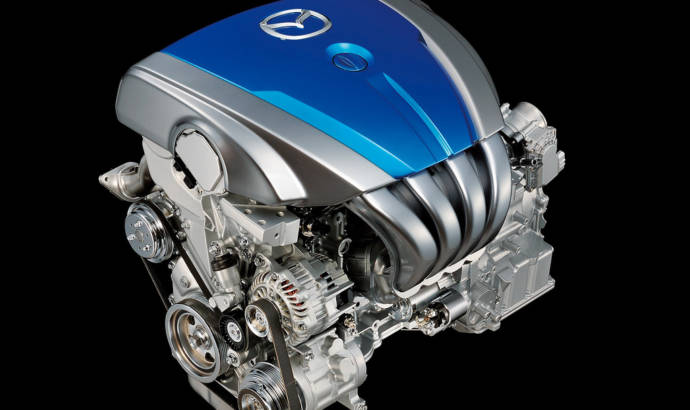
28 Sep 2009
0

